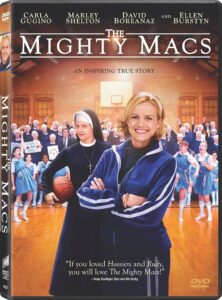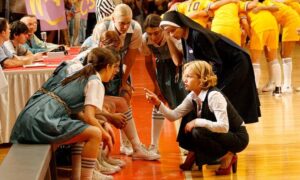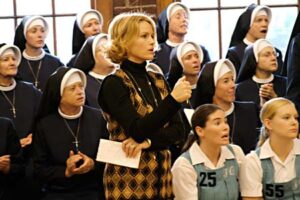 One of my favorite—yet little known—inspirational sports movies is the 2009 drama, The Mighty Macs. This true story factors strongly into this post, though for the moment I’ll put it on the back burner.
One of my favorite—yet little known—inspirational sports movies is the 2009 drama, The Mighty Macs. This true story factors strongly into this post, though for the moment I’ll put it on the back burner.
There is no denying that interest in women’s basketball, both college and pro, is at an all-time high in 2024. NCAA Tournament games broke records for viewership and in some cases outdrew men’s NBA games. WNBA teams are reporting record ticket sales and are even moving some of their games to larger arenas in their respective cities. Outstanding collegiate players like Angel Reese, Kamilla Cardoso, Jo Jo Watkins, Cameron Brink, and the superstar of superstars, Caitlin Clark, made watching women’s basketball must-see happenings.
But it wasn’t always like that, not even a few years ago. And definitely not half a century in the past.
THE GYM BURNED DOWN
In The Mighty Macs we meet Cathy Rush, played by Carla Gugino. Her husband, Ed Rush, is an NBA referee who travels a lot. Cathy, who played basketball in high school and college, decides to take a job as a head coach for tiny Immaculata College, an all-girls Catholic school in rural Pennsylvania, not far from Philadelphia. The year is 1971, and for girls and young women, basketball is little more than an intramural activity.

Cathy outlines a play for the Mighty Macs.
But the times they are a-changin’, because in 1972, for the first time ever, a women’s national championship tournament will be held. This is a precursor to the NCAA tourney. Something to aspire to, though a pipe dream for Immaculata. The college is in financial trouble and may be sold to a group who would build a subdivision on the land. Most of the few girls on the team would rather be doing something else. Their home games will have to be played at a nearby high school gym, because Immaculata’s gym had recently burned down.
A HALL OF FAME CAREER
But Cathy, a tough taskmaster, battles through the college’s problems and her team’s indifference. With the help of her assistant coach, a young nun called Sister Sunday, she whips the girls into competitive shape. After a terrible start to the 1972 season the Mighty Macs start winning. And winning. And winning some more…

The older nuns are among the team’s biggest boosters.
You can guess where this is going, so I’ll call a spoiler alert—not necessarily for the film itself, but for the career of Cathy Rush, which will undoubtedly give it away. Her Immaculata teams made six Final Four appearances, winning three national titles. Her coaching record: 149-15. She was inducted into the Naismith Basketball Hall of Fame, the Women’s Basketball Hall of Fame, and a number of others. Her Immaculata team played the first nationally televised women’s game in 1975, the first women’s game in Madison Square Garden, also in 1975, before nearly 12,000 fans, as well as—a year earlier—the first women’s college team to play outside the U.S. when they went to Australia. I could list a lot more of her accomplishments, but you can best check them out on Wikipedia. They are impressive.

Caitlin Clark is now a pro with the Indiana Fever.
As for the film: The Mighty Macs depicts perseverance with great dollops of humor and poignancy, and its believable basketball sequences are truly inspiring. And I’m sure Cathy Rush is more than pleased over the current state of women’s basketball from the humble beginnings that she engendered.

I apologize ahead of time for an emotional response to this post. I have tried three times to write something that did not sound angry, but I couldn’t do it. So, I will simply keep it as brief as possible.
As a woman over a certain age, reading posts like this one is painful. The progress (read: respect for our wide-ranging abilities and right to self-determination) women have struggled to gain over the course of my lifetime is being stolen from us at a speed not believed possible… until it started happening.
Yes, the times are indeed a-changing yet again. We are facing the loss of this progress far faster than we gained it. Caitlin Clark and others are benefiting from the hard work of people like Cathy Rush. But what is going to happen to her if she gets pregnant by accident and is told she can’t keep doing what she does so well because she no longer has a choice?
If things go as many hope they do, by 2025 most of the progress made by so many will be gone.
Let’s hope not, Kate. I share many of your feelings. So did my dear Jacqueline, big-time.
Let’s not forget Anne Meyers’s. UCLA great. Drafted by NBAs Indiana Pacers. Look her up. What basketball player, coaching and management career.
Yes, she was one of the best.